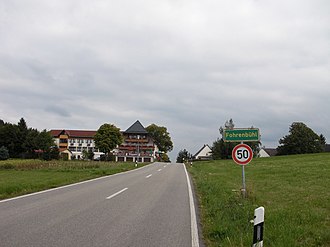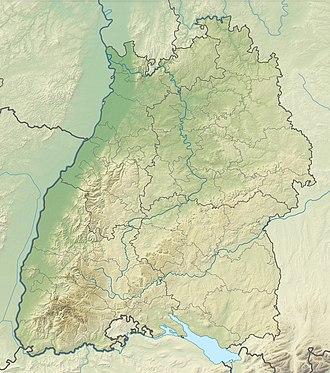Fohrenbühl
| Fohrenbühl | |||
|---|---|---|---|
|
Pass height |
|||
| Compass direction | west | east | |
| Pass height | 786 m above sea level NHN | ||
| state | Baden-Württemberg | ||
| Valley locations | Hornberg | Schramberg | |
| expansion | Pass road L 108 | ||
| Mountains | Black Forest | ||
| Map (Baden-Württemberg) | |||
|
|
|||
| Coordinates | 48 ° 14 '8 " N , 8 ° 17' 39" E | ||
The Fohrenbühl is a mountain or a pass summit in the Black Forest . The pass road connects Hornberg in Gutach Valley with Schramberg in Schiltach Valley and runs through Reichenbach and Lauterbach . At the top of the pass ( 786 m above sea level ) there is a small settlement. This settlement also bears the name Fohrenbühl and is largely part of the Lauterbach community (Black Forest) and is referred to as the Lauterbach district of Fohrenbühl. The Fohrenbühl pass and the Fohrenbühl settlement (Lauterbach district) are located below the Mooswaldkopf , which is one of the highest elevations in the central Black Forest .
A road running on the ridge line crosses the pass road and divides the settlement into a Hornberg and a Lauterbach part, it is part of the north-south long-distance Mittelweg hiking route through the Black Forest from Pforzheim to Waldshut . The settlement is today tourist (four restaurants) and agriculture and forestry oriented.
history
The former border between Baden and Württemberg runs on the Fohrenbühl , a border that has always been a district, state and religious border at the same time. Lauterbach belonged as part of the former County of Hohenberg to Upper Austria , but fell to Württemberg in the Peace of Pressburg in 1805. Due to the former Austrian rule, Lauterbach was Catholic. Hornberg was part of Württemberg, thus Protestant, and fell to the Grand Duchy of Baden in 1810 through an exchange. Thus the curiosity arose at two inns just 25 m apart, that the Gasthof Schwanen, which belonged to Hornberg, was Württemberg until 1810 and then became Baden, and the Gasthof Adler, which had previously belonged to Lauterbach, fell to Württemberg from 1805.
Schellenmarkt
Every year at Whitsun on the Fohrenbühl there is a fair called Schellenmarkt , which takes its name from the traded cowbells . This traditional market was mentioned in a document as early as 1548. Originally it was a traditional meeting of shepherds, at which the cowbells were exchanged and self-made things such as carvings were traded. The bell markets at Whitsun used to be widespread in the Black Forest; today there is just one more Schellenmarkt, also at Whitsun, on the Biereck near Haslach .

It was a custom for shepherds to be off duty on the Pentecost holidays; Arthur Achleitner writes about this in his short story "Poison Klärle" :
- "... Is that also a way of leaving the pasture in broad daylight? And because of what? Just so that the guy can make his preparations for the Schellenmarkt! Haha! I will drive him out of the bell business! "
- "Well, Klärle! It is an old custom that the shepherds gather on Whitsunday for the Schellenmarkt on Fohrenbühl! "
- "So, and should I herd the cattle on Pentecost Sunday?"
- "Who is talking about you ?! The next best servant can do that. Pentecost Sunday has belonged to the shepherds since time immemorial, and the farmers of the whole district have obeyed this custom and tend their cattle themselves on the anniversary! "
The meeting was an important day on the calendar for the shepherds, and part of it was celebrating and socializing. Achleitner states in a footnote:
“The scramble after the official Schellenmarkt without an acute cause is traditional and has subsequently led to the market being banned by the Baden authorities and the following year by the Württemberg authorities. In any case, the existence of the Baden police hour forced the revelers to leave the 'Schwanen' at 11 a.m. and move to the Württemberg 'Adler'. It is not allowed to dance in any economy. In more recent times, the police presence of the Baden gendarmerie and the state troops from Württemberg has prevented major excesses. "
Today the Schellenmarkt is run by the Schwanenwirt and the “Bies-Büdie Freiamt 05 e. V. ”, and there are also rides and other fairground attractions. The annual rush is long too big for the local gastronomy, so that a marquee has to create space for the rush of visitors; Brass bands from near and far provide entertainment for the visitors. But even today there is sometimes a brawl on Pentecost Sunday evening; However, trained forces quickly ensure calm.
gastronomy
The Zum Roten Löwen tavern in Hornberg had a monopoly on the catering business for the Reichenbach community (now the Reichenbach district), and 235 years passed from the first objection to this regulation in 1557 until inns were allowed to open in the Reichenbach district. In 1785 the Gasthaus Zum Schwanen opened on the Fohrenbühl . The Adler Gasthaus, located on the other side of the border in Lauterbach, has existed since 1780, and two other restaurants (Café Lauble and Gedächtnishaus Fohrenbühl) were added in the 20th century.
literature
- City administration Hornberg (ed.): 900 years Hornberg , Konkordia, Bühl [Baden] 1993.
- Walter Salmen: Customs or Fake Appreciation? On the Schellenmarkt on the Fohrenbühl , in: Badische Heimat 33 (1953), p. 170.
- Arthur Achleitner : Poison clarification in "In the green Tann" Black Forest novels , Association of Book Friends Schall & Grund, Berlin.
Web links
- Fohrenbühl, photographic impressions and tourism
- Fohrenbühler Schellenmarkt historical review
- Full-text stories from “Imgrün Tann” at Projekt Gutenberg




